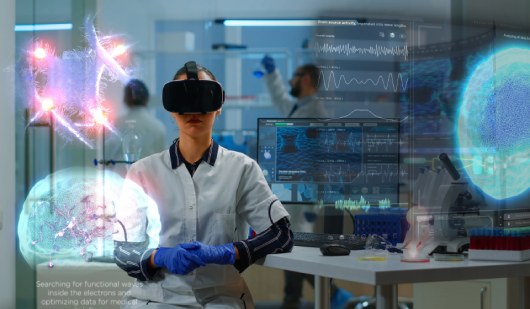-
In today's rapidly evolving digital landscape, the convergence of healthcare, metaverse, and blockchain technologies promises to revolutionize the way we approach healthcare delivery, patient care, and medical innovation. In this comprehensive blog, we'll embark on a journey through the intersection of these transformative forces, exploring the potential synergies, applications, and implications for the future of healthcare. For more about how blockchain is revolutionizing healthcare, visit our healthcare blockchain development services.
Healthcare in the Digital Age
The healthcare industry is undergoing a profound transformation driven by advances in technology, changing patient expectations, and the need for more efficient and accessible healthcare services. From telemedicine and wearable devices to personalized medicine and artificial intelligence, digital technologies are reshaping every aspect of healthcare delivery and patient experience.
The Rise of the Metaverse
The metaverse, a virtual shared space where users can interact with each other and digital objects in real-time, is rapidly gaining traction as the next frontier of digital innovation. With the advent of virtual reality (VR), augmented reality (AR), and mixed reality (MR) technologies, the metaverse offers immersive and interactive experiences that blur the lines between the physical and digital worlds. Also, Explore | Application of Blockchain and Internet of Things (IoT) in Healthcare
Blockchain Technology: Powering Trust and Transparency
Blockchain technology, best known as the underlying technology behind cryptocurrencies like Bitcoin and Ethereum, holds immense potential to revolutionize the healthcare industry. With its decentralized and immutable ledger, blockchain enables secure and transparent data sharing, streamlined processes, and enhanced trust and accountability in healthcare transactions.
Exploring the Intersection
Now, let's delve into how the convergence of healthcare, metaverse, and blockchain technologies can unlock new possibilities and reshape the future of healthcare:
Virtual Healthcare Consultations
Imagine stepping into a virtual clinic within the metaverse, where patients can consult with healthcare providers in real-time using VR/AR technology. Blockchain ensures the security and privacy of patient data, enabling seamless sharing of medical records and ensuring compliance with regulatory requirements.
Medical Training and Education
Virtual reality simulations can provide medical students and healthcare professionals with hands-on training experiences in a safe and controlled environment. Blockchain can verify the authenticity of medical credentials and certifications, enhancing trust and transparency in medical education and training. Also, Check | Revolutionizing Healthcare with Web3
Personalized Medicine and Health Tracking
Wearable devices and health-tracking applications can collect real-time data on patients' health metrics and activities. Blockchain secures and decentralizes this data, empowering patients to take control of their health information and participate in personalized medicine initiatives.
Supply Chain Management and Drug Traceability
Blockchain ensures the integrity and transparency of pharmaceutical supply chains, enabling end-to-end traceability of drugs from manufacturing to distribution. In the metaverse, users can access virtual pharmacies and securely purchase prescription medications using blockchain-based digital identities.
Medical Research and Collaboration
Virtual research laboratories and collaborative platforms within the metaverse can facilitate global collaboration among researchers and scientists. Blockchain enables transparent and auditable data sharing, accelerating the pace of medical research and innovation while protecting intellectual property rights.
The Prospects of the Intersection in Healthcare
As we navigate the convergence of healthcare, metaverse, and blockchain technologies, the future of healthcare looks brighter than ever before. By harnessing the power of digital innovation, collaboration, and patient-centricity, we can create a healthcare ecosystem that is more accessible, equitable, and efficient for all. You may also like | Why Develop Blockchain-Based dApps for Healthcare
Conclusion
The intersection of healthcare, metaverse, and blockchain represents a transformative opportunity to reimagine healthcare delivery, patient care, and medical innovation in the digital age. By embracing innovation, fostering collaboration, and prioritizing patient empowerment and privacy, we can build a future where healthcare is truly personalized, accessible, and inclusive for everyone. Connect with our blockchain developers to know more about how integrating these transformative technologies with healthcare can prove to be revolutionary.

Our Offices
INDIA
Emaar Digital Greens, Sector 61,
Gurugram, Haryana
122011.
Welldone Tech Park,
Sector 48, Sohna road,
Gurugram, Haryana
122018.















